The mark of a truly good theater piece is that, like life, it takes you though a range of emotions. At Thornton Wilder’s The Skin of Our Teeth at Everyman Theatre in Baltimore, the whole of human experience is laid before you. And, just for giggles, the Pulitzer Prize–winning Wilder takes the audience on a trip through time and introduces new themes throughout. Also, woolly mammoths and dinosaurs (spoiler alert). The first time I saw this play I knew nothing about it going in, and I think that’s the best way to experience it. The concept is so unusual — and it breaks so many theatrical conventions we’re used to (even more so back in 1942) — that the chaos of trying to figure out what’s going on only adds to the intensity of the play’s action.
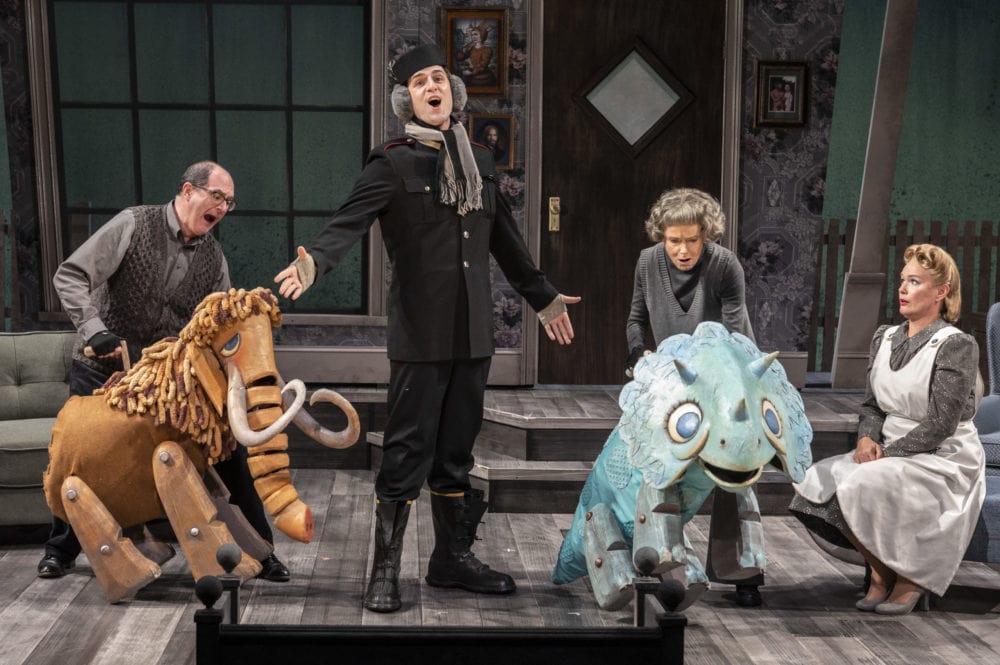
It is rumored that Thornton Wilder wrote this play in the actual trenches, and there are many bleak moments that reflect the gravity of war. But the piece was also written with a bit of humor, elements of the absurd and surreal, and even meta commentary and fourth-wall-breaking, which delights the audience. This fairly traditional production of The Skin of Our Teeth echoes Wilder’s original intent, and was directed by mainstay Noah Himmelstein, who calls the piece a “fantasia” that starts in a classic sitcom world and ends in the rubble of post-war New Jersey. To help you understand the scope of the piece, themes include: raising the next generation, Christianity, philosophy, familial problems, gender relations, war (and its aftermath), the treatment of refugees, civil unrest, marital infidelity, environmental destruction, politics, and history (and what we learn from it). There is also a lot of relevance to the current pandemic. So, buckle up.
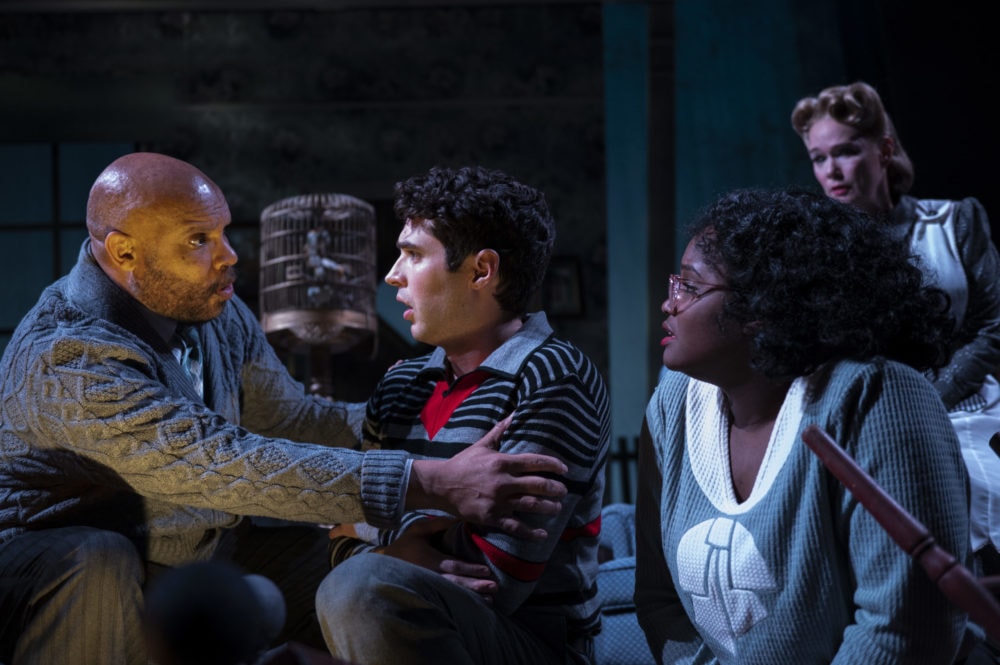
The family in The Skin of Our Teeth represent the Bible’s original human couple and their children — in this case, father George (played by Jefferson A. Russell), mother Maggie (played by Beth Hylton), Abel (the favorite, long dead), Cain/Henry (played by Zack Powell), and Gladys (who represents “the normal child” — played by Deidre Staples). Long-suffering maid Sabina (played by Felicia Curry) rounds out the household. Their last name is Antrobus (from the Greek άνθρωπος [anthropos] meaning “human” or “person”), and Cain is renamed Henry to prevent George’s ire. The obstacles they face (aside from a seven-year war) resemble two of the Biblical plagues.
Director Himmelstein seems authentically connected to the meaning behind the themes and shows that he understands the mercurial nature of Wilder’s script. At the beginning of the piece, he directs his actors to be highly stylized and presentational, and then beautifully guides their zigzag into the chaos of asides, unexpected arrivals, puppets, and extreme special effects. He gives the gripping final act a delicate touch, allowing the actors’ natural talents to shine. There are also some wonderfully quiet moments. The chemistry and underlying good humor of the actors are palpable throughout, the moments of physical closeness are touching, and the space and levels are used to their utmost.
The cast is spectacular overall — with many of Everyman’s resident company members stealing the spotlight. But first on stage was Felicia Curry, who positively galloped into my heart with her nuanced performance. Already knowing she is DC’s sweetheart didn’t make much of a difference, since she is a great physical comedian and grabs the audience right from the top. She’s compelling and hilarious, with undeniable star quality, and gets to thrill in tiny outfits and post-apocalyptic road gear. It’s sad because her character Sabina takes the brunt of the awkward/toxic male-female dynamic that was pervasive in stories back then, and she grapples with being a third wheel on the couple’s marriage. She is either tempting George to cheat, ascending to being a “second wife” to him, or descending back to being a sexualized maid. However, her character gets the most asides and meta remarks, and therefore gets the most laughs. It’s probably an okay trade-off, considering she also gets to disavow the dirty B.S. that’s happening on stage by refusing to do certain scenes.
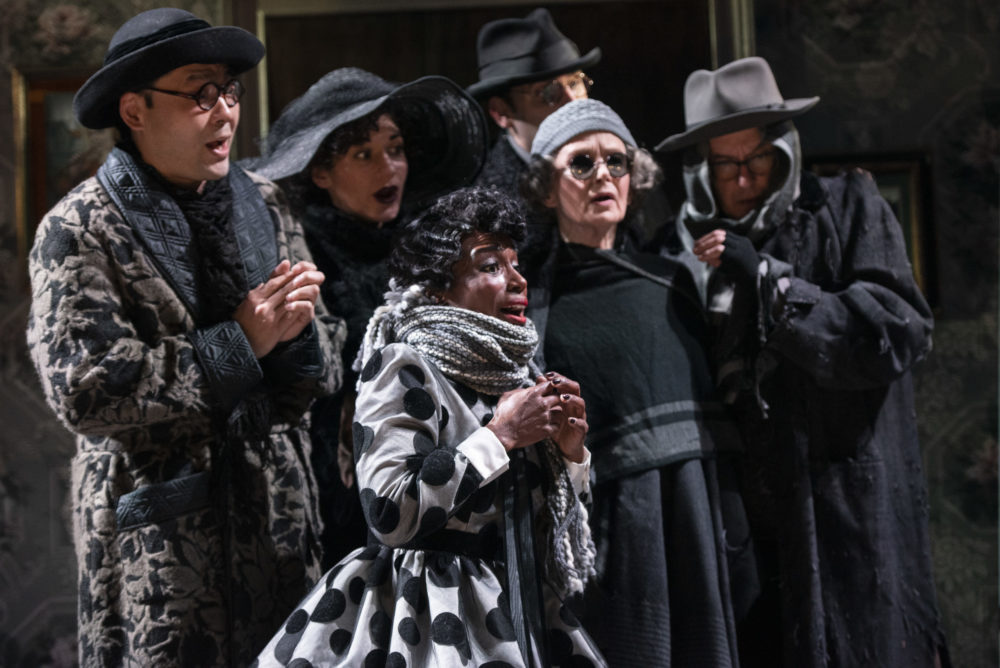
As George, Jefferson A. Russell was great at fluctuating between the overblown inventor, the politician, and the disaster survivor. George is a source for much of the history and philosophy in the piece, as he is obsessed with books and important men, and wants to make his mark. The character shows the inherent flaws in the patriarchal system. Russell has a commanding physical presence, and gets to show pride, reflection, defeat, and raging anger — all done well. I saw the indomitable hope in Russell’s eyes, felt the fruitlessness of his efforts in his body, and heard the weight of the world in his voice. Beth Hylton is perfectly cast as another multifaceted character, Maggie. Hylton’s self-assured performance is striking. She is made up as the ideal wife and mother, and wears it well, passionately embodying Maggie’s spirit of resilience. But, as Sabina says, she is a “tigress,” and the up-and-down relationship with George doesn’t help Maggie’s moods. The character shows that the partnership between men and women is deeply fractured, but necessary. And, sadly, she does stand by her man throughout, which means she has to deal with being the victim and the perpetrator of woman-on-woman crime. It’s difficult to watch. But at the end of it all, she is the “original mother,” and cannot escape her duty to nurture and rebuild.
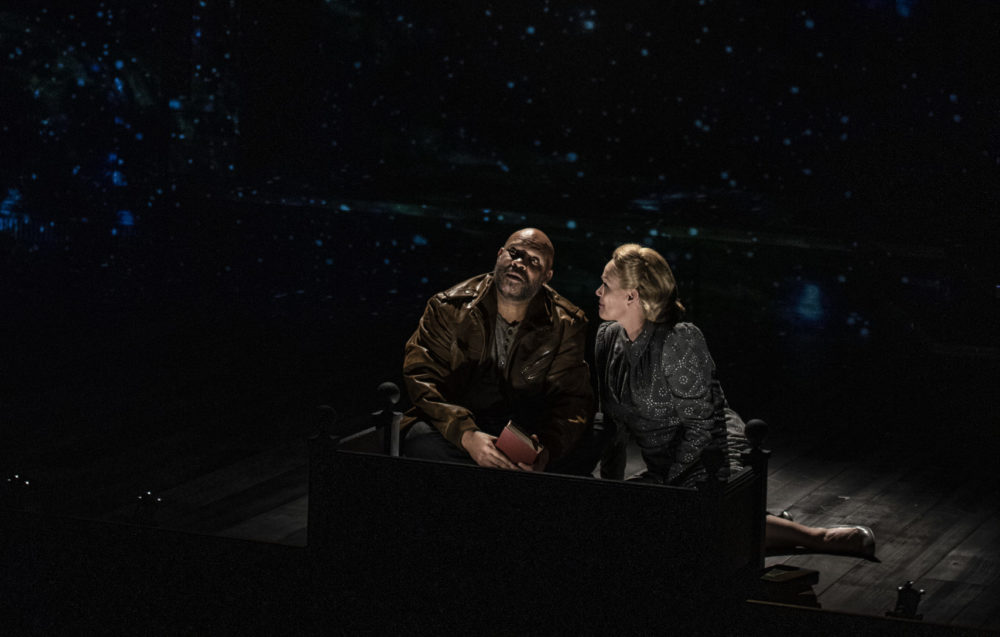
The children (R.I.P. Abel, uncast) are a duo that swing wildly between competing, carousing, and committing crimes. Gladys is saddled with the fact that Cain/Henry is a literal murderer, and like, keeps murdering people for no reason, and this is kind of an ethical dilemma for her. Deidre Staples, in her first appearance with Everyman, glows in the part. She’s saucy, smart, and eager to please as the conscience of the family. Her warmth draws the audience to her, and Gladys perseveres to the end with the strength of a tigress cub. As Cain/Henry, Zack Powell is a broken heartthrob. He broods; he has a strong profile; he’s good at acting. Ugh. Powell plays the bad boy to a hilt — graduating from a petulant slingshotter in short pants to a malignant college kid to the Final Boss. He’s giving Kylo Ren vibes with the whole returning-unwanted-son thing. But Powell also gets some lighthearted moments in his socks and slides in Atlantic City, which he carries off well. It’s fun to see.
The rest of the cast was solid. Zack Powell and Deidre Staples were double cast, and got some quick changes and amusing bits in their ensemble roles. Danny Gavigan, Helen Hedman, Hannah Kelly, Tony Nam, and Bruce Randolph Nelson were like major players — filming news segments, driving the understudies scene, and taking on heavy puppeteering and caroling duties. Danny Gavigan captured attention as the thickly-accented Jersey messenger, Helen Hedman was captivating as the Fortune Teller, Hannah Kelly got lots of laughs as the Stage Manager, and Tony Nam was a charming newsman and political toady. But the audience favorite, as always, was Bruce Randolph Nelson. A diamond sparkles in even the dimmest light, and this humble yet spellbinding actor cannot help drawing eyes — even when he’s just manipulating a puppet. He even got to show off his “Balmer” accent, which drove the local regulars wild with laughter. The final actors who must be mentioned are the puppets (designed and directed by James Ortiz), which make a huge contribution to the atmosphere of the play. Some are cute, some breathtaking, and some provoke profound emotion. It helps that the players operate them with complete attention, silent reverence, and an appropriate level of empathy.
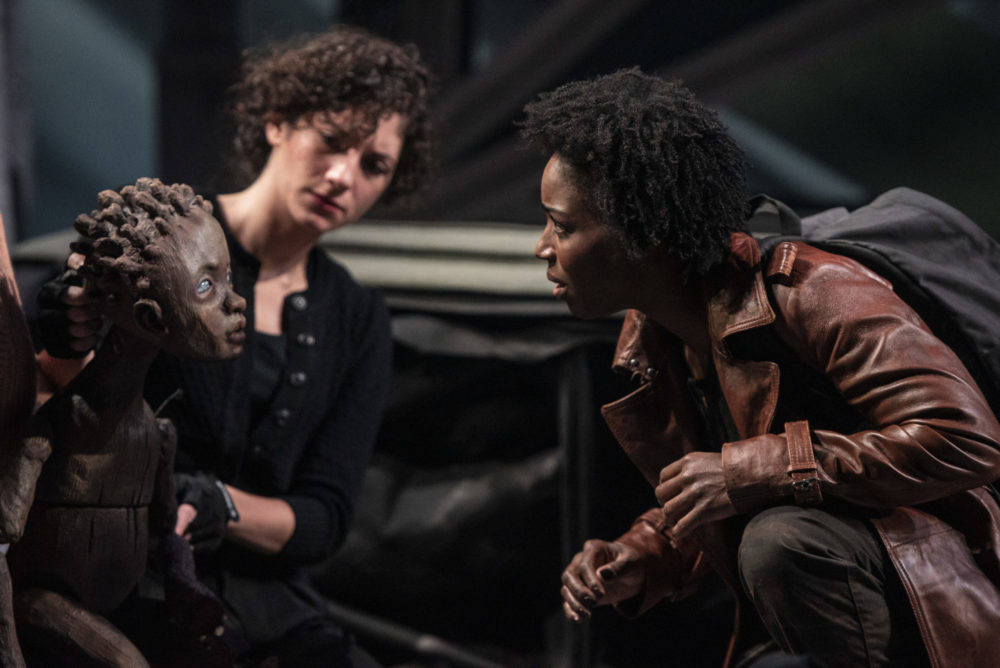
The rest of the creative team for The Skin of Our Teeth deserves praise as well. The squad includes Daniel Ettinger on set design, who succeeds well in his use of artifice. Abstract pieces hang to represent major structures and are complemented by the realism of floral wallpaper, chandeliers, and Elizabethan portraiture. The palette of the family house is a moody combination of grays, blues, and greens. For Act II’s Atlantic City, the scene appropriately switches to brighter colors, lit streetlights, and twinkling boardwalk signs. Finally, the dust-covered furniture, broken-out windows, and fallen roof of Act III reflect the destruction of war. For all three acts, the curtain backdrop is a Pollock-esque rain-speckled window that serves as ice, ocean, and smog. It descends halfway on one side for the third act, a haunting physical representation of the breakdown in the piece.
Costume designs are by David Burdick, and give a lovely wink to absurdism/clowning (Sabina’s polka-dot outfits), the East Coast (tweeds, woolens, leathers, and fishermen sweaters in grays and blacks), boardwalk culture (primary colors, boaters, and highwaters), Vaudeville (top hats and tails), and, of course, Biblical themes (Maggie’s snake dress). Everything was perfectly matchy-matchy, which I very much appreciated.
Lighting design was by Daisy Long, who thought well outside the box (and stage) with her boundary-breaking abstract designs for the apocalyptic events. Sound design and original music composition were by Megumi Katayama, and her work really stood out in the immersive and impressive underwater scene. Projection design was by Rasean Davonte Johnson, who provided a deluge of visual augmentation for the disaster scenes, along with the humor and added context of the newsreel segments.
Additional artistic credits go to Denise O’Brien as wig designer, Amy Kellett as scenic charge, Anna O’Donoghue as the dramaturg, and Lewis Shaw as the fights and intimacy coach. Jamie J. Kranz serves as stage manager, and Laura C. Nelson as the assistant stage manager.
Running Time: Two hours 45 minutes, including two intermissions.
The Skin of Our Teeth plays through January 2, 2022, at Everyman Theatre, 315 West Fayette Street, Baltimore, MD. The show may also be viewed online anytime from December 24, 2021, through January 15, 2022. Tickets (in-person, $29–$59; streaming, $19.99) may be purchased online or by calling 410-752-2208. Box office hours are Monday to Friday from 9 am until 6 pm, and Saturdays from 10 am until 5 pm.
The digital program can be viewed here.
COVID Safety: Everyman Theatre’s policies and practices are here.
Everyman Theatre is supported in part by grants from The Maryland State Arts Council (msac.org), The Citizens of Baltimore County, Mayor Brandon M. Scott, and the Baltimore Office of Promotion and the Arts. Everyman is a proud member of the Bromo Tower Arts and Entertainment District, the Market Center Merchants Association, and the Greater Baltimore Cultural Alliance.
About Everyman Theatre: Everyman Theatre is a professional Equity company celebrating the actor, with a Resident Company of Artists from the Baltimore/DC area. Founded in 1990 by Vincent M. Lancisi, the theater is dedicated to engaging the audience through a shared experience between actor and audience. Lancisi partners with Managing Director Marissa LaRose. The company is committed to presenting high-quality plays that are affordable and accessible. They strive to engage, inspire, and transform artists, audiences, and communities through theater of the highest artistic standards. Everyman stands in solidarity with Black, Indigenous, and People of Color, and AAPI communities and is committed to an equitable, diverse, and inclusive atmosphere at every level. To learn more, visit everymantheatre.org/everyman-theatre-stands-solidarity.




